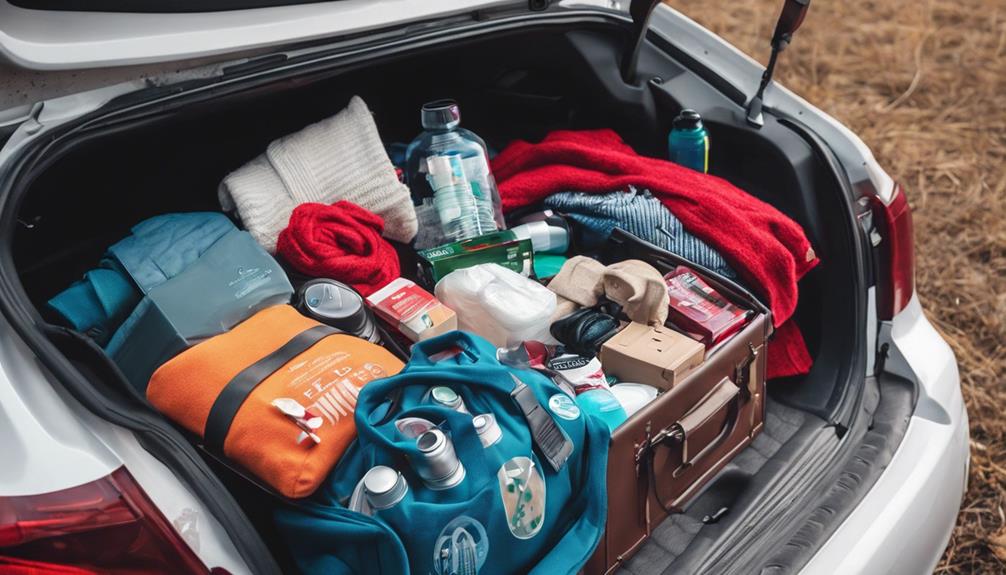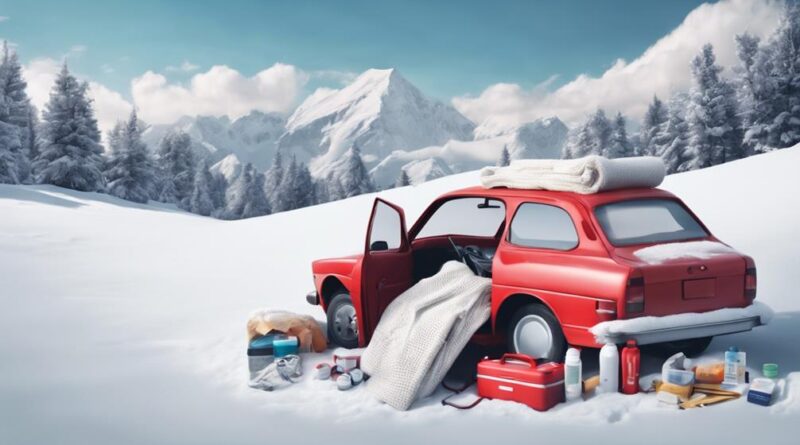5 Best Tips for Winter Road Trip Preparation
Are you prepared for the challenges of winter driving? Making sure your vehicle is ready and equipped for the colder months is crucial for a safe journey.
From checking maintenance to having essential supplies on hand, these tips will help you navigate through snow and ice.
Stick around to discover the best ways to ensure a smooth and stress-free winter road trip.
Check Vehicle Maintenance
Make sure to check your vehicle maintenance before embarking on a winter road trip. Start by checking your tire pressure. Cold weather can cause tire pressure to drop, leading to decreased traction and increased risk of accidents. Properly inflated tires ensure better grip on icy roads. Use a tire pressure gauge to check that the pressure matches the manufacturer's recommendations.
Next, inspect your engine coolant. The coolant, also known as antifreeze, prevents the engine from freezing in cold temperatures. Ensure that the coolant level is adequate and that it has the correct concentration. A mixture of 50% coolant and 50% water is usually recommended for winter conditions. You can use an antifreeze tester to verify the strength of the coolant.
Pack Emergency Kit
Check that your emergency kit is fully stocked with essential items before hitting the road for your winter trip. Having a well-prepared emergency kit can make all the difference in case of unexpected events during your journey.
First and foremost, ensure you have a comprehensive first aid kit that includes bandages, antiseptic wipes, pain relievers, and any necessary medications for you and your passengers. This is crucial in case of minor injuries or medical issues while on the road.
Additionally, don't forget to pack items for roadside assistance. Include essentials such as jumper cables, a flashlight with extra batteries, a multipurpose tool, a tow rope, and reflective triangles or flares to make your vehicle visible in case of a breakdown. These items can help you address common car issues and stay safe while waiting for help to arrive.
Moreover, consider adding blankets, extra warm clothing, non-perishable snacks, and water bottles to your emergency kit. In the event that you get stranded in cold weather, having these supplies can keep you comfortable and nourished until help reaches you.
Monitor Weather Conditions
Monitoring weather conditions is essential for a safe and successful winter road trip. Stay updated on the latest weather forecasts to prepare for any potential challenges along your route. Before embarking on your journey, check the forecast not only for your starting point and destination but also for the areas you'll be passing through. This proactive approach will help you anticipate any inclement weather and plan detours if necessary.
Keep an eye out for weather advisories, road closures, or hazardous conditions that may affect your travel plans. Snowstorms, icy roads, and low visibility can all pose significant risks during winter road trips. By staying informed, you can make informed decisions about when to travel, where to stop, and whether any adjustments to your itinerary are needed.
In addition to checking the weather forecast, monitor real-time updates during your trip. Use weather apps, GPS navigation systems, or local radio stations to stay informed about changing weather patterns. If you encounter unexpected weather challenges, be prepared to adjust your route accordingly. Planning detours in advance can help you avoid dangerous road conditions and ensure a smoother journey.
Plan Route Carefully
To ensure a smooth and safe winter road trip, carefully mapping out your route is crucial for navigating potential weather-related challenges. When planning your journey, consider utilizing navigation options such as GPS devices or apps that provide real-time traffic updates and alternative routes in case of road closures or heavy snow. These tools can help you adapt to changing conditions and avoid getting stuck in hazardous situations.
In addition to navigation aids, it's essential to identify rest stop locations along your route. During winter road trips, rest stops serve as crucial points for taking breaks, stretching your legs, and ensuring you stay alert and focused while driving. Look for rest areas with amenities like restrooms, food options, and fuel stations to replenish supplies and stay comfortable throughout your journey.
Furthermore, when selecting rest stops, prioritize locations that are well-maintained and have clear pathways in case of snow accumulation. Ensure that these areas are accessible and safe for parking, especially during winter conditions when icy surfaces can make maneuvering challenging. By planning your route carefully and incorporating these navigation options and rest stop considerations, you can enhance the overall safety and enjoyment of your winter road trip.
Dress in Layers
When preparing for a winter road trip, dressing in layers is essential to ensure you stay warm and comfortable in fluctuating temperatures. Winter weather can be unpredictable, and having the right clothing can make a big difference in your comfort level throughout the journey.
Here are some tips to help you stay warm and comfortable:
- Base Layer: Start with a moisture-wicking base layer to keep sweat away from your body and help regulate your temperature.
- Insulating Layer: Add an insulating layer such as a fleece or down jacket to trap heat close to your body.
- Outer Shell: Wear a waterproof and windproof outer shell to protect yourself from snow, rain, and wind chill.
- Accessories: Don't forget to wear a hat, gloves, scarf, and thick socks to keep extremities warm and prevent heat loss.
Equip With Snow Chains
Outfit your vehicle with snow chains to enhance traction on snowy and icy roads during your winter road trip. Snow chain installation is crucial for navigating through challenging winter conditions safely. Before setting off, familiarize yourself with the process of installing snow chains on your vehicle. It's recommended to practice putting them on a few times in ideal conditions so you can confidently do it when you encounter snow-covered roads.
When installing snow chains, ensure your vehicle is parked on a flat surface. Lay the chains flat and untangled next to the tire you'll be placing them on. Drape the chains over the tire, making sure they're centered. Connect the chains according to the manufacturer's instructions, securing them tightly around the tire. Once they're properly attached, move the vehicle slightly forward to expose the rest of the tire and finish securing the chains.
Similarly, understanding snow chain removal is equally important. When you reach a clear road or your destination, carefully remove the chains to prevent damage to your vehicle or the chains themselves. Always have a pair of gloves handy to protect your hands from the cold and any sharp edges on the chains. By being prepared with the knowledge of snow chain installation and removal, you'll be ready to tackle winter roads confidently.
Stock up on Supplies

Prepare for your winter road trip by stocking up on essential supplies to ensure a safe and enjoyable journey. When hitting the road during the winter season, it's crucial to have the right gear and provisions to stay warm and well-fed. Here are some key items you should include in your supply list:
- Winter Clothing: Pack extra layers such as thermal underwear, gloves, hats, scarves, and waterproof boots. Being prepared with warm clothing can help you stay comfortable in case of unexpected stops or emergencies.
- Food Provisions: Carry non-perishable snacks like granola bars, nuts, and dried fruits. It's also a good idea to have some easy-to-prepare meals on hand, such as instant noodles or canned soups. Don't forget to bring an ample supply of water to stay hydrated throughout your journey.
- Emergency Blankets: In case you get stranded or face a breakdown, having emergency blankets can provide crucial warmth while waiting for help to arrive.
- Flashlights and Batteries: Be ready for any nighttime emergencies by packing reliable flashlights with extra batteries. This will help you navigate dark areas or signal for help if needed.
Inform Someone of Plans
To ensure your safety and peace of mind during your winter road trip, make sure to inform someone of your plans before embarking on your journey. Communication strategies are essential when sharing your itinerary with a trusted individual. Provide details such as your route, expected arrival times at key points, and contact information for accommodations. This way, if an emergency arises, someone will know where to find you.
In addition to communication strategies, informing someone of your plans is a vital safety precaution. In case you encounter unexpected challenges like extreme weather conditions or vehicle issues, having a designated person aware of your itinerary can be a lifesaver. They can alert authorities or provide assistance if you fail to check-in as planned.
When sharing your plans, be sure to include alternative routes or backup options in case your original itinerary needs adjustments. Safety precautions should also involve sharing your intended return date and a deadline for when to raise the alarm if they haven't heard from you. Establishing this communication protocol ensures that help can reach you promptly if needed, enhancing your overall safety during the winter road trip.
Frequently Asked Questions
How Often Should I Check My Tire Pressure During a Winter Road Trip?
During a winter road trip, you should check your tire pressure every time you stop for gas. Proper tire pressure is crucial for winter driving, as it affects traction and handling.
Winter tire selection is important for improved grip on snow and ice, but maintaining the right tire pressure is equally essential.
Make it a habit to check your tire pressure regularly to ensure a safe and smooth winter road trip experience.
Are There Any Specific Precautions to Take When Driving on Icy Roads?
When driving on icy roads, remember to use winter driving techniques to stay safe. Keep a safe distance, avoid sudden movements, and drive at a slower speed.
It's crucial to have an emergency kit with essentials like blankets, water, snacks, a flashlight, and a first aid kit in case of any unforeseen situations.
Stay vigilant and prepared while navigating icy road conditions for a smoother winter driving experience.
What Should I Do if I Get Stuck in a Snowstorm During My Winter Road Trip?
If you get stuck in a snowstorm during your winter road trip, stay calm and don't leave your vehicle.
Use emergency supplies like blankets, food, and water to stay warm and hydrated.
Try to communicate your location to rescuers using your phone or other means.
Keep your car visible by tying a brightly colored cloth to the antenna.
Stay inside until help arrives to ensure your safety and survival.
Is It Recommended to Carry a Spare Set of Keys for My Vehicle During a Winter Road Trip?
Carrying a spare set of keys for your vehicle during a winter road trip is highly recommended for emergency preparedness. Key duplication can save you from being stranded in the cold if you lose or lock your keys inside the car.
It's a simple precaution that can make a big difference in stressful situations. Remember to keep the spare keys in a safe place while traveling to ensure you have a backup plan if needed.
How Can I Prevent My Vehicle's Windshield From Fogging up in Cold Weather?
To prevent your vehicle's windshield from fogging up in cold weather, there are a few things you can do.
You can use anti-fog products specifically designed for windshields.
Also, make sure to use proper defrosting techniques by turning on your car's defroster and adjusting the temperature to a level that will help clear the fog.
These steps can help ensure a clear view while driving in winter conditions.
Conclusion
Before hitting the road for your winter road trip, make sure to check your vehicle, pack an emergency kit, monitor weather conditions, and plan your route carefully.
Dress in layers, equip with snow chains, stock up on supplies, and inform someone of your plans. By following these tips, you can ensure a safe and enjoyable winter road trip experience.
Stay prepared and stay safe out there!
